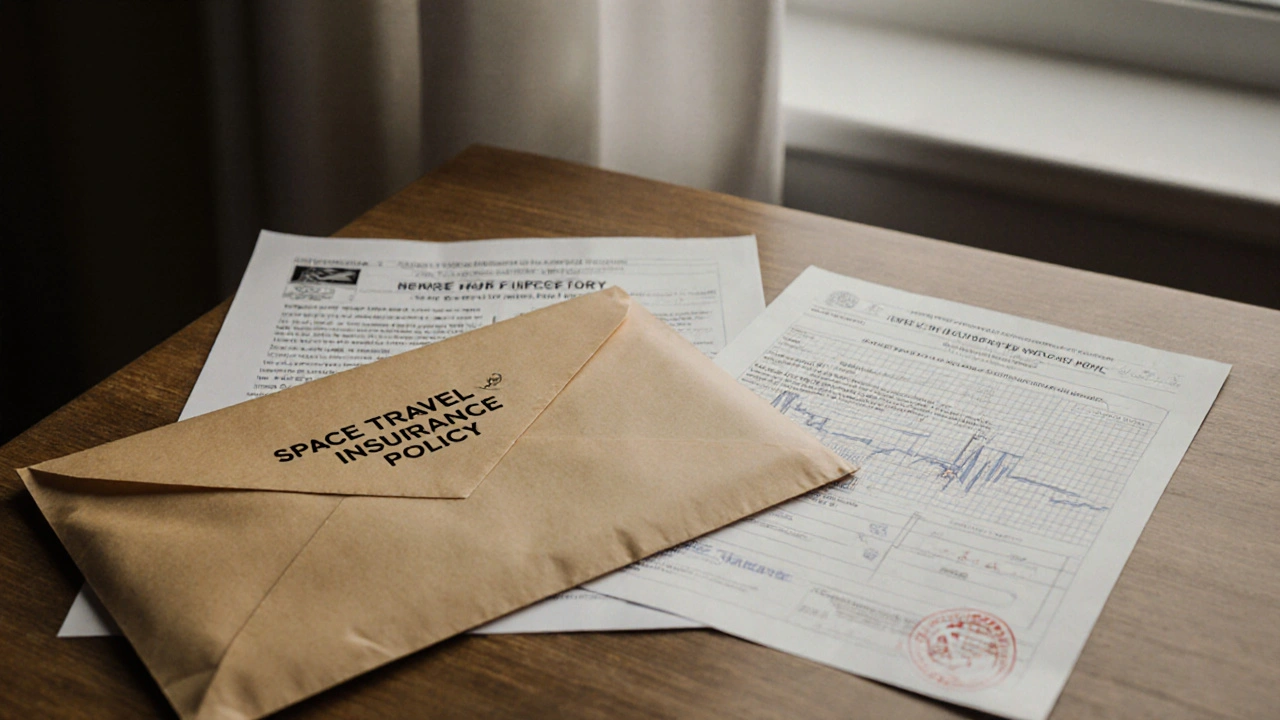Buying a ticket to space doesn’t just mean preparing for zero gravity and stunning views of Earth. It means stepping into a world where traditional travel insurance doesn’t apply-and where the risks are unlike anything on this planet. As of 2025, fewer than 700 people have ever flown to space as tourists. But for each of them, the question remains: what happens if something goes wrong?
What Space Travel Insurance Actually Covers
Space travel insurance isn’t like your typical vacation policy. You won’t find coverage for lost luggage or flight delays. Instead, it’s built around one core idea: protecting you from catastrophic events during suborbital or orbital flight. The only major provider offering dedicated passenger coverage as of 2025 is Battleface, underwritten by Lloyd’s of London. Their policy includes two primary benefits: accidental death and permanent disablement.
That means if you suffer a fatal injury during launch, re-entry, or while in space, your beneficiaries receive a payout. If you survive but lose a limb or suffer permanent paralysis due to G-forces, microgravity trauma, or an emergency ejection, you get a lump sum based on the policy’s limit-typically up to $1 million. This is the only tangible financial protection currently available to civilians flying with companies like Virgin Galactic or Blue Origin.
But here’s the catch: it doesn’t cover everything. Medical evacuation from orbit? Not included. Emergency treatment for decompression sickness or radiation exposure? Excluded. Even if you’re hospitalized in New Mexico or Texas after landing, your policy won’t pay for the ambulance ride or ICU stay. That’s because space insurance is designed as a safety net for death or total disability-not routine medical care.
What’s Left Out (And Why)
Exclusions in space travel insurance are longer than the waiver you sign before launch. Most policies explicitly deny coverage for:
- Pre-existing medical conditions-especially those related to heart health, bone density, or inner ear balance
- Long-term health effects like radiation damage or muscle atrophy that may appear years later
- Injuries caused by failing to follow safety protocols during training or flight
- Psychological trauma from the experience, including PTSD or severe anxiety
- Damage caused by space debris, even if your spacecraft is hit during orbit
Why these gaps? Simple: insurers don’t have enough data. There’s no history of claims to predict risk. No one has ever died on a commercial spaceflight. No one has ever needed emergency surgery in orbit. So companies like Battleface and AXA XL can only insure against events they can model-death and permanent injury. Everything else is too unpredictable.
Even the Kessler Effect-the theoretical chain reaction of space debris collisions-isn’t covered. Why? Because no one can prove it will happen. And if it does, the cost would be astronomical. Insurers aren’t betting on that scenario… yet.
How Much Does It Cost?
Space travel insurance isn’t cheap. Premiums run between 2% and 4% of the total trip cost. For a $450,000 Virgin Galactic flight, that’s $9,000 to $18,000 just for insurance. Compare that to a $10,000 trip to Antarctica, which might cost $300 in travel insurance. The difference? Risk level.
Why so high? Because insurers have to cover the entire cost of a single accident. If one flight goes wrong, the premiums collected from all other passengers might not even cover the payout. That’s why only a handful of underwriters-mostly Lloyd’s syndicates and a few divisions of Munich Re and AXA XL-offer this coverage. It’s not a volume business. It’s a high-stakes gamble.
Deductibles are just as steep. Most policies have a $250,000 deductible. That means if you’re injured and the medical bill is $300,000, you pay the first $250,000 yourself. Only then does the insurance kick in. For most people, that makes the policy more of a psychological comfort than a financial safety net.

How It’s Different From Regular Travel Insurance
Standard travel insurance covers trip cancellations, lost passports, medical emergencies abroad, and flight delays. Space travel insurance doesn’t touch any of that.
Here’s a quick comparison:
| Feature | Space Travel Insurance | Regular Travel Insurance |
|---|---|---|
| Accidental Death | Yes (up to $1M) | Usually included, but capped at $50K |
| Medical Evacuation | No | Yes (up to $500K) |
| Pre-existing Conditions | Always excluded | Often excluded, but sometimes covered with waiver |
| Trip Cancellation | Yes (only if medically disqualified) | Yes (for most reasons) |
| Space-Specific Risks (G-forces, radiation, microgravity) | Only covered if they cause death or permanent injury | Not covered at all |
| Premium (for $450K trip) | $9,000-$18,000 | $225-$450 |
The bottom line? Regular travel insurance is designed for the common risks of flying and traveling. Space travel insurance is designed for the rarest, most extreme outcomes. It’s not meant to protect your vacation-it’s meant to protect your family if you don’t come back.
Who Can Buy It?
You can’t just click “buy now” on a website. To qualify, you must pass medical screening that rivals NASA’s astronaut standards. Insurers require:
- Full medical history from your primary care doctor
- Cardiac stress test results
- Neurological evaluation
- Proof of physical fitness (no BMI over 30, no history of seizures or fainting)
- Waiver signed by a notary, often 3+ weeks before launch
Even then, insurers can deny coverage at the last minute. One passenger in 2024 was turned down because a minor irregularity showed up on his EKG. He’d flown with Virgin Galactic before-but this time, the insurer flagged it as a risk. He got a refund, but no policy.
There’s no appeal process. No second opinion. The insurer’s decision is final. That’s because they’re operating without a legal safety net. Courts have never ruled on whether a waiver signed by a tourist overrides an insurer’s right to deny a claim. So they play it ultra-safe.
What Happens If You Get Hurt?
There has never been a single confirmed claim paid out for a space-related injury. Not one.
That doesn’t mean it won’t happen. In fact, experts predict the first major lawsuit will occur within the next two years. When it does, it will change everything. Will the waiver hold up? Will the insurer pay? Will the operator be held liable? No one knows.
Right now, if you’re injured after landing, you’re on your own. Your health insurance might cover hospital bills-if they don’t classify your injury as “experimental” or “high-risk activity.” Medicare and Medicaid won’t touch it. Private insurers may deny claims based on “participation in commercial spaceflight.”
And if you’re stranded in space? There’s no rescue plan. No emergency medevac from orbit. The spacecraft’s crew isn’t trained for medical emergencies. The capsule doesn’t have an onboard defibrillator. The only thing standing between you and disaster is the pilot’s skill and the vehicle’s reliability.

Is It Worth It?
For most people? Probably not.
If you’re paying $450,000 for a spaceflight, you’re likely already wealthy. You probably have life insurance, disability coverage, and a trust fund. The $1 million payout from space insurance won’t change your family’s future. But it might give you peace of mind.
For the few who can’t afford to lose everything-like small business owners or single parents-the policy is a gamble. You’re paying $15,000 for a 0.001% chance of death. The odds are astronomically low. But so is the chance of being struck by lightning.
Some travelers buy it because the operator requires it. Others buy it because they’re told it’s “standard.” But the truth? Most space tourists don’t even know what’s in their policy. The documents are dense, written in legalese, and rarely explained in plain language.
One Reddit user, OrbitalJourney88, wrote: “The waiver was 47 pages long. I had to sign it three weeks before flight. No opportunity to negotiate terms. No one explained the insurance.”
What’s Next for Space Travel Insurance?
The industry is moving slowly-but it’s moving. In late 2024, the International Space Insurance Consortium standardized how “passenger injury” is defined across 12 major insurers. That’s a big step. No more confusion over what counts as “permanent disablement.”
AXA XL is partnering with Space Medicine Associates to integrate real-time biometric monitoring into future policies. Imagine: if your heart rate spikes dangerously during launch, the system triggers an automatic payout. That’s parametric insurance-no claims process, just sensors and algorithms.
By 2030, experts predict space tourism will grow 22% per year. More flights. More passengers. More data. That means better models. Lower premiums. Fewer exclusions.
But until then? You’re flying into the unknown. And your insurance? It’s just a piece of paper.
Does my regular health insurance cover injuries from space travel?
Most health insurance plans exclude injuries from “high-risk activities” or “commercial spaceflight.” Even if your policy covers skydiving or scuba diving, space travel is treated as a separate, unregulated risk. Many insurers will deny claims outright, calling it an “experimental procedure.” Always check your policy’s fine print before booking a flight.
Can I buy space travel insurance after booking my flight?
No. You must apply for coverage at least 60 days before launch. Insurers require time to review your medical records and complete underwriting. Some providers won’t even accept applications after the training phase begins. Waiting until the last minute means you’ll be uninsured.
What if I change my mind and cancel my spaceflight?
Most space travel insurance policies cover cancellation only if you’re medically disqualified by a licensed physician. If you cancel because you’re scared, your company keeps your money. Battleface has processed a few cancellation claims for medical disqualifications, but those are rare. Don’t assume you’ll get a refund.
Are there any government-backed space travel insurance programs?
No. NASA astronauts are covered by federal life and disability insurance. Private space tourists are not. There is no U.S. or international government program that insures civilians flying to space. All coverage comes from private insurers-and they operate with minimal regulation.
Why don’t more companies offer space travel insurance?
Because the market is too small and too risky. Only about 15% of space tourists buy supplemental insurance. With fewer than 100 flights per year globally, insurers can’t collect enough premiums to cover a single major accident. Only a few underwriters-like Lloyd’s of London and AXA XL-have the capital and expertise to take the risk.
Final Thoughts
Space travel insurance isn’t about protecting your trip. It’s about protecting your legacy. It’s the last line of defense in a journey where no one knows what could go wrong-and no one has ever been held accountable when it does. If you’re flying, you’re not just a tourist. You’re a pioneer. And pioneers don’t always come home.


14 Responses
Interesting breakdown. I’d still rather have a solid life insurance policy than this space-specific one. The $250k deductible makes it feel like a placebo.
Let’s be real-this isn’t insurance, it’s a modern-day indulgence for the ultra-rich who think they’re pioneers but are really just paying to be the first to die in a rocket. The exclusions are laughable: no coverage for radiation damage? That’s like buying a parachute and being told it won’t open if you’re falling through a cloud. We’re talking about humans entering an environment where the body literally decays without gravity, and insurers treat it like a rollercoaster with a waiver. The fact that no one’s died yet doesn’t mean it’s safe-it means we haven’t had the first catastrophic failure yet. And when it happens? The legal chaos will be unprecedented. No court has ruled on whether a tourist’s signed waiver overrides negligence. The operators? They’re all hiding behind contracts written by lawyers who’ve never set foot in a spacecraft. This isn’t innovation. It’s capitalism with a spacesuit on.
So you’re telling me I pay $18k to get $1M if I die… but if I lose my mind from isolation or get radiation poisoning that turns me into a human pincushion 10 years later? Too bad. That’s not insurance, that’s a death bet with a fancy brochure. And the fact that they won’t cover PTSD? My therapist would bill more than this policy.
OMG this is the most ridiculous thing I’ve read all week. You pay almost 20k for insurance that literally says ‘we won’t pay if you get hurt’ and people are still lining up? Who even reads these waivers? I bet half the buyers think it’s like travel insurance for your vacation to Mars. And don’t even get me started on the deductible-$250k?! That’s more than most people’s annual salary. This isn’t insurance, it’s a tax on delusion. And the fact that they won’t cover space debris? What if a rogue satellite takes out your capsule? You’re just… toast. Literally. And no one’s gonna cry. Just a 47-page document and a selfie with a billionaire.
Think about it-we’re at the edge of human evolution and we’re still treating risk like a spreadsheet. We send people to space and give them a policy that only pays out if they die or lose a limb. What about the soul? What about the trauma of seeing Earth from above and realizing how fragile it is? No insurance covers that. No algorithm predicts the moment you realize you’re not a tourist-you’re a witness. And maybe that’s the real cost. Not the money. The change. The irreversible shift in how you see everything. And yet we’re arguing over deductibles like it’s a car insurance quote. We’ve lost the wonder. We’re just commodifying the sublime.
I find it fascinating how this mirrors our broader relationship with risk and technology. We’re willing to pay enormous sums to experience something beyond our biology, yet we’re terrified of the consequences. The insurance model here is essentially a mirror of our society: we want the thrill, but we don’t want to take responsibility for the fallout. It’s ironic that the same people who fund these flights often have the most comprehensive health and life coverage already-so why buy this? Is it for peace of mind? Or is it for social signaling? The fact that insurers refuse to cover long-term effects like radiation damage or muscle atrophy speaks volumes. They’re not just avoiding liability-they’re refusing to acknowledge that space travel isn’t a one-day event. It’s a lifelong transformation. And if we’re going to send civilians up there, shouldn’t we be thinking about the whole human, not just the moment of launch?
Just a quick note on the medical screening: if you’ve ever had a fainting spell or a minor arrhythmia, you’re likely disqualified. That’s not just strict-it’s exclusionary. The standards are basically astronaut-level, but without the training or support. It’s like saying ‘you can’t ride a bike unless you’ve raced in the Tour de France.’
How charming. Pay $18,000 for the privilege of being told you’re not covered if you get sick after a trip that could kill you. And yet, somehow, this is the ‘responsible’ choice? I’m sure the billionaires are just thrilled to be saving their heirs from a $1 million payout. What a noble sacrifice.
US companies are the only ones smart enough to even offer this. Other countries? They’d rather ban it than insure it. America leads. Again.
Man, I read this and thought ‘this is Canada’s problem now?’ We don’t even have decent dental care but we’re supposed to care about space tourists getting insurance? I mean… I get it, but still. We got people freezing in tents and you’re talking about $250k deductibles? Just sayin’.
So… the only thing keeping you alive is a billionaire’s ego and a waiver you didn’t read? And you think that’s progress? I’m not impressed. I’m just waiting for the first Reddit thread titled ‘I survived space but now my kidneys are toast and my insurance said ‘not covered.’
In South Africa, we say: ‘If you are going to climb the mountain, you must know the cost of the fall.’ This policy reflects that truth-but it also reveals how little we care about those who fall. The wealthy fly. The rest of us watch. And we are told it is safe because no one has died yet. But history teaches us that the first death is always the most expensive.
Look, if you’re rich enough to buy a ticket to space, you’re rich enough to buy a private jet to get to the hospital. This isn’t insurance-it’s a status symbol. You don’t need coverage. You need a better lawyer.
They’re lying. The government knows how dangerous this is. That’s why they won’t regulate it. This is all a cover-up. The first death? It’s already happened. They’re just hiding the body. And the insurance? It’s all a front to make you think you’re protected. You’re not. You’re a lab rat with a fancy seatbelt